Everyone wants a comfortable, affordable home that fits their family’s size, lifestyle, and unique personality. But that kind of home can be difficult to find. If you're tired of your current living situation or have experienced some life event that requires moving, you now have the opportunity to reassess your housing needs and consider the many different options before you.
As you begin house hunting, you’ll have to weigh costs, convenience, and customization or other factors to determine what makes the most sense for you. There are lots of lovely houses on the market at any given time, but there’s also the appeal of a custom house that’s designed specifically for you. With our guide, we hope to help you make the best decision for your family and find the exact kind of home you want right here in Oklahoma.
Most prospective home buyers will settle on purchasing an existing home. They’re probably familiar with the home hunting and mortgage process and don’t want to wait on a dream home. They’ll find a great house with the most important features they need and settle in.
The key to finding the perfect existing home for your family is being able to prioritize your needs and wants and being willing to compromise when you find a house that has most of what you want along with some things you could do without.
With that in mind, here are some types of houses that have unique qualities many families are looking for, along with the disadvantages to these types of homes that you will need to consider before buying.
If you feel drawn to vintage charm or quirky features, you’ll love a historic home. They’re full of history and character and your residency adds just another chapter to its story. Historic homes are known for their wide range of eye-catching architectural styles and unique details that you just can’t find in newer homes.
Often, these characteristics extend to the neighborhood; you may find yourself part of an eclectic historic district community. A perk of living in a historic district is that local government may offer tax incentives or lower interest rates on loans to purchase and maintain a historic home in order to preserve the area’s rich past. This financial perk can really help out home buyers who don’t have a big budget.
 However, it’s this kind of maintenance that can end up costing you more years down the road. The older the home, the more repairs it will require to keep it habitable. And we’re not talking chipped paint or ugly light fixtures. Old homes often suffer from water damage, structural problems, electrical issues, and more. You may also find standard comforts of modern living are missing, such as central air. Or if modern conveniences were added over the years, the house may look like a mismatched amalgamation of different time periods.
However, it’s this kind of maintenance that can end up costing you more years down the road. The older the home, the more repairs it will require to keep it habitable. And we’re not talking chipped paint or ugly light fixtures. Old homes often suffer from water damage, structural problems, electrical issues, and more. You may also find standard comforts of modern living are missing, such as central air. Or if modern conveniences were added over the years, the house may look like a mismatched amalgamation of different time periods.
Additionally, if you hope to make any major renovations yourself, you may be prohibited or slowed by municipal historic preservation laws applicable to structures in special zoning districts such as Historic Preservation Districts and Urban Design Districts. In Oklahoma City there are seven official Historic Preservation Districts. They are:
-Crown Heights
-Edgemere Park
-Jefferson Park
-Mesta Park/Heritage Hills/Heritage Hills East
-Paseo
-Putnam Heights
-Shepherd
There are also Urban Design Districts that include:
-Bricktown
-Downtown
-Scenic River
-Stockyards City
-Asian District
-Paseo
-Capitol Hill
-property along the NW 23rd Street corridor.
You can view all of the special zoning districts in Oklahoma City on this map.
Finally, home insurance is typically higher on historic homes because of the structural and damage issues mentioned before.
If you want a home you can really make your own and you aren’t afraid to get your hands dirty, a fixer upper might be for you. These homes are often priced cheaper and get quickly passed over by buyers looking for turnkey homes, so if you’re searching for a deal and can look beyond worn carpets and old windows, a fixer upper is a great way to get a new-to-you home on a budget.
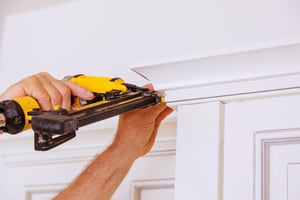 Buying a house on the cheap leaves money for renovations and changes you want to make to really personalize a home without the hassle of building new. There are many government programs to help buyers purchase and flip homes too, not to mention property taxes are lower on reduced-price homes. Many people relish a big project like home renovation and will enjoy the process of picking everything themselves and even doing some of the work with their own two hands.
Buying a house on the cheap leaves money for renovations and changes you want to make to really personalize a home without the hassle of building new. There are many government programs to help buyers purchase and flip homes too, not to mention property taxes are lower on reduced-price homes. Many people relish a big project like home renovation and will enjoy the process of picking everything themselves and even doing some of the work with their own two hands.
Of course, there are some pitfalls to buying a fixer upper. You need to make sure you get a good inspection beforehand and understand how much it will cost in time and money for any necessary projects to make the home habitable. Depending on your budget, you may need to space out projects over many years before you get the home in the condition you want, and there’s always the risk that a project goes unexpectedly over budget.
If you need to move into a home fast, a fixer upper might not be ready for you as quickly as you need. Finally, HGTV makes renovations look fun, but if you don’t have an eye or patience for design, a fixer upper project is going to be more pain than pleasure and you might find yourself in over your head.
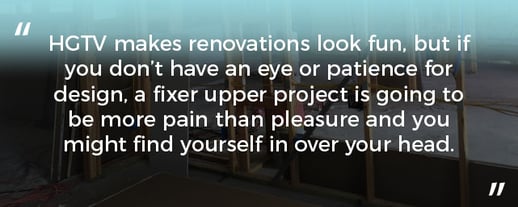
A new home is a home built in the last 50 years that needs minimal work to be habitable. Most homes on the market will fit this description so this is the easiest kind of house to find. Home buyers like a newer home because it is quick to buy and move into and usually has all the standard modern conveniences you would expect. If you want to do renovations to personalize your new home, you can, but most homes won’t require anything major immediately.
The cons of a newer home are you will probably be paying full price and there are few government programs or incentives to help you financially unless you’re a first time homeowner. Most newer homes will look similar to the other homes in the neighborhood, and even if the neighborhood doesn’t have any historical significance you may still be prohibited by the HOA from making major cosmetic changes.
Finally, every house needs major repairs someday, and a house that’s just a few decades old may be due for such a repair just a few years after your bank account takes the hit of purchasing the house itself.
In other words, buying a newer home is probably the easiest, but the ease will cost you and your home may not reflect your unique personality the way some people want.
Ultimately, the kind of house you choose comes down to what’s most important to you. If you need something budget-friendly but reflects who you are, a fixer upper might be best. If money isn’t an issue but timing is, you’re best going the new home route. And for someone who loves unique details with a storied past, look for an older home.
However, if you’ve been searching for your dream house for awhile and keep coming up short because your unique mix of necessities make it difficult to compromise, there is one more option you can consider: building a home.
For families with very unique needs and wants in their home, a custom-built house might be the answer. You get to personalize everything about it and create a unique home that reflects your lifestyle like no existing house will. You even get to pick the location of your house! You also have the benefits of a brand new structure that will require no major repairs (and thus expenses) for many years.
However, the process of building and buying a new home can be long and challenging, not to mention expensive, if you don’t know what you’re doing. If you don’t do your homework, you can fall into any of multiple home building pitfalls.
But I don’t want to talk you out of building your dream home. It is entirely doable— Turner & Son has done it for hundreds of Oklahoma families like yours. I just want to give you some tips to help you get started and keep the process as smooth as possible. Everyone deserves a home that fits their family’s ideals, and I hope this guide will help you make your dreams a reality.
The first step in building your own home is choosing your own land. Yes, you not only get to pick the size of rooms and countertop material for your custom home, you get to pick its location too! But before you snatch up the first lot you find for a great price, there are some things you need to know.
How different is a five-acre lot in a neighborhood from a five-acre tract miles away from a neighbor? They're more different than you might think.
That's one of the first decisions that you'll face when you decide that you want to build in the country – subdivision or raw land. Neither one of these is better than the other, but one will suit you more depending on what you're looking for in a home and a neighborhood.
Let me tell you about a couple of the differences between these two situations so that you can make a good decision.
Building in a rural subdivision
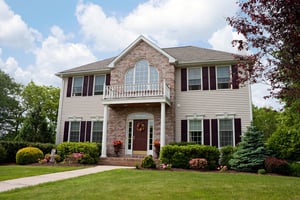 The upside of an established subdivision is that you won't have to deal with some of the logistical problems that come with raw land. The developer has already extended utilities to the property and the address is established. Since a subdivision is typically on its own street, you also won't have to worry about fronting on a main road. The main advantage here is simply that a lot of the land prep work is done for you.
The upside of an established subdivision is that you won't have to deal with some of the logistical problems that come with raw land. The developer has already extended utilities to the property and the address is established. Since a subdivision is typically on its own street, you also won't have to worry about fronting on a main road. The main advantage here is simply that a lot of the land prep work is done for you.
While you might be sitting on the same amount of land as you would farther away from town, you're still going to be dealing with neighbors and a homeowners' association. In the subdivision setting, there are typically going to be rules about what you can build on your property, what type of fence you can use, etc. And along with having a say in what you can do, the association will usually require you to pay dues to maintain the greenery and other common facilities.
To sum it up, in a subdivision you'll get the acreage and the privacy that you're looking for without having to do the heavy lifting of preparing land. But you will likely have to deal with a homeowner's association and they may have a say in what you build.
Building on raw land
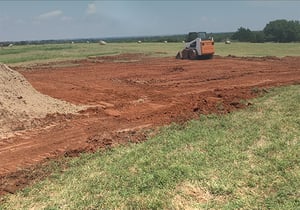 When you build on raw land, a developer is out of the picture. You can be as far from a neighbor as you'd like, and nobody is going to tell you what you have to build. So if you're looking for that highest level of privacy and control of your home and your life, raw land is a good choice.
When you build on raw land, a developer is out of the picture. You can be as far from a neighbor as you'd like, and nobody is going to tell you what you have to build. So if you're looking for that highest level of privacy and control of your home and your life, raw land is a good choice.
The drawback with raw land is that there isn't a developer with utilities, surveys and logistical problems taken care of. You'll need to get a pin survey and make sure that there aren't right-of-way or egress problems. You'll need to make sure that you can get electrical service and sewage. There are usually some issues like these with raw land. A good builder can help you sort them out.
With raw land, you get true freedom to build the home you want wherever you want, but you'll have to deal with all of the land-prep issues that you'd avoid in a subdivision.
Maybe you have a good idea of what kind of lot you want, but you've been searching for a while and you're getting a little frustrated with the process. And then you find a great deal on the last available lot in a particular area. Lucky you! Or maybe not.
There's a reason that lot you're thinking about buying is still vacant. Your job is to figure out if that reason is a deal-killer or not.
When a land developer starts selling lots, he or she usually doesn't vary the prices enough to account for the real differences in desirability. As a result, the lots get cherry-picked, either by builders, the people buying the custom home, or both. Here's what that usually means:
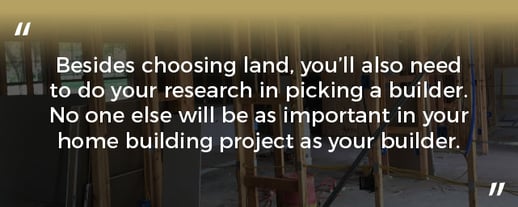
The unsuspecting buyer who's looking to build a house on his or her own land comes along and thinks she's found a hidden gem. But it's highly likely there's an issue of some kind.
We once had a client with a lot he had just bought in a neighborhood that had been developed some 20 years prior. He got a really good deal. But then we discovered a problem. The FEMA floodplain maps had been redrawn in the interim, and the house would need to be raised seven feet above the existing level of the land.
With costs for concrete, labor, fill dirt, etc., it was going to take $70,000 to make that lot suitable for building. That $20,000 lot became a $90,000 lot.
If you're looking at the last lot in a development, be sure to do your homework first.
Besides choosing land, you’ll also need to do your research in picking a builder. No one else will be as important in your home building project as your builder. This is the person who will guide you through the process as well as help you design the perfect house plan, estimate costs, influence your banker, pick materials, and finally build your dream home all within your budget.
You need someone with the experience to prevent and fix issues and the expertise to deliver on your dreams without wasting time or money. That’s a tall order, but I plan on giving you some guidance on how to find just such a person.
When it comes to building a new home, there are different kinds of builders. And the builder you need depends on what you're looking for in the finished product and what you're looking for in the process.
Here's an overview of the different types of builders and what to expect.
Production Builder
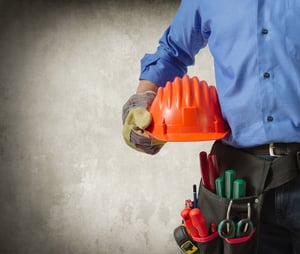 A production builder is good if you want to live in a neighborhood, you want a house built sooner rather than later, and your budget is tight. In most cases, you're also not looking for a home you plan to live in forever.
A production builder is good if you want to live in a neighborhood, you want a house built sooner rather than later, and your budget is tight. In most cases, you're also not looking for a home you plan to live in forever.
Production builders only build in developed neighborhoods. They may be the ones developing the ground or they may buy a few lots from a developer alongside other builders in the same price range. They build from several different house plans with a few standard options, but they don't customize a house plan for each customer.
While there isn't a lot of flexibility in design or options, the fact that they're building the same few house plans in close proximity gives the builder an efficiency that keeps costs down. You also have the opportunity to buy existing inventory, either a completed home or one still under construction, which can save time.
If you don't want to make a bunch of decisions about your home, then a production builder is a good choice. Here are a few things to look for when searching for a good production builder:
This type of builder works from a portfolio of plans and will customize a house plan for each customer. They don't design from scratch, nor do they build a house from a plan the customer provides.
They'll be able to quote you a price per square foot because they know the house plans in their portfolio and have a good idea from past experience what each one will cost to build. But that means each change to the plan comes with uncertainty for the builder and added cost for you. You'll have lots of flexibility in color and material selections as long as you stay within the options they're used to providing.
With semi-custom homes, the builder might provide the construction financing, which means he or she will build the house and sell it to you when it's finished, or you might be asked to provide the construction loan. They might have some inventory you can view or even buy, either finished homes or some still under construction. Ask if you can walk through any existing homes in their inventory to get a feel for a particular plan.
If you're leaning toward a semi-custom home builder, here are a few things to look for as you choose a builder:
3. Watch out for lots of waste, as inefficient control of materials can drive up cost and increase your price.
Custom Builder
 If you own your own land, plan to buy your own land, or have very specific needs and wants in a new home, then a custom builder is right for you. They can build pretty much any house plan—one they design from scratch for you, one that combines the best of several plans you like, or one that you bring to them.
If you own your own land, plan to buy your own land, or have very specific needs and wants in a new home, then a custom builder is right for you. They can build pretty much any house plan—one they design from scratch for you, one that combines the best of several plans you like, or one that you bring to them.
Using a custom builder means lots of flexibility in design, features, and materials. The only limitations are the methods common to residential construction, such as the materials used for walls, veneer, windows, and doors.
You might be able to bring some of your own materials and/or fixtures, such as custom lighting, high-end or very specific appliances, and even pieces of stone or other natural materials that aren't easily reproduced.
With a custom builder, you'll spend more time in the design and selection phases determining all the details. With this approach, you provide the construction financing in the form of a construction loan since the home is specific to you.
Custom homes generally take longer to build because everything about it is a prototype. It's never been built, so some unique problems will need to be solved during construction. You'll have more flexibility to make changes during construction, but those changes cost both time and money.
With a custom build, you'll invest much more time and energy in the building process. There are more decisions to make, and you'll naturally want to be more involved in every phase of construction. Because it is your vision coming to life, you'll feel a greater sense of connection to the home from start to finish.
Here are a few things to keep in mind when choosing a custom builder:
1. Many of the same things apply as with other builders, such as neat and tidy job sites, employees driving well-maintained vehicles, and not a lot of waste lying around the job site.
2. Progress on the custom builder's job sites will be slower than either the production or the semi-custom builder. This stems from several sources, including longer lead times on custom materials and waiting for specialty contractors that the builder doesn't use on every job.
For the best possible home building experience, decide which kind of buyer you are and look for the type of builder that fits you best. Matching your needs with the builder's process will make for a much more pleasant experience all around.
Any competent builder can build a good house, but building the house is only about half the process. More and more companies are saying they can build on your land, but is that really true? Do they have the experience necessary to navigate the complexities of building on raw land?
Builders who are accustomed to building in pre-defined neighborhoods have a lot of the prep work done for them by a developer. That includes engineering, drainage, street access, and lot clearing. It also includes all the site boundaries, easements, and right-of-way surveys—all the legal stuff that says you can actually build there. Plus, you need to know the floodplain determination and get a measurement of the weight bearing capacity of the soil, which impacts where and how you build.
That's a lot of background work!
We're seeing the market in Oklahoma City starting to consolidate. The large and mid-size builders are cornering the market on available lots, and the smaller builders are getting squeezed a bit. Some builders see the "build on your land" market as a way to increase their sales.
All that background and prep work mentioned above? It's now the responsibility of the builder when they're building on your land.
There are a lot of complexities to building on rural property. We've seen everything from land title issues to landlocked properties to impossible drainage and lot clearing that will cost as much as the house. A typical neighborhood builder doesn't have experience with those issues, and they may not know how to navigate them successfully.
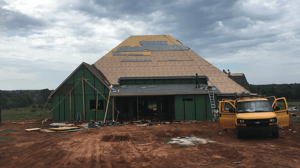 Not only are there lots of things to worry about when building on rural land, but they all need to be done right the first time. If you own land that you've dreamed of building on, you only get one shot at it. That land is unique and your home will be unique, just like you and your family. One mistake from an inexperienced builder can cost you your dream or make your dream more costly.
Not only are there lots of things to worry about when building on rural land, but they all need to be done right the first time. If you own land that you've dreamed of building on, you only get one shot at it. That land is unique and your home will be unique, just like you and your family. One mistake from an inexperienced builder can cost you your dream or make your dream more costly.
When it comes to building on your own land, you want a builder who can say, "Been there, done that." Do your research and make sure the builder you choose has plenty of experience building on rural land and navigating the complex challenges that can arise.
Since we talk to dozens of people in the market to build a new home in Oklahoma City and surrounding areas, as well as hundreds of Realtors working to help their clients find the right builder, we get asked frequently about our thoughts on the many, many builders in the Oklahoma City area.
Building a new home is a big deal. It's a big investment of time and money, the biggest investment most people make in a lifetime. In Oklahoma, there is very little regulation of the home building industry, and it's very difficult for the average person to know how to evaluate all the choices. To make matters worse, there is a very low barrier to entry into the home building business - I think all you need is a pickup truck and a tape measure. How are you supposed to choose?
Unfortunately, I think many people end up choosing by some combination of price per square foot and "standard features" (that term "standard features" makes my skin crawl - as if you are a "standard person" and should just accept what a builder installs "standard" because he thinks that's what you should have in your house... but I digress).
Maybe I can help a little. My family has been in the home building business in Oklahoma since 1964. My dad knows just about everyone in the business, and over the last 18 years, I've studied the industry through the lens of a mechanical engineering background.
Seems like we ought to know who the best builders are in Oklahoma City, so it only makes sense to share. So, here is our opinion of the top 3 home builders in Oklahoma City:
Matt Wilson Custom Homes & Pools
Matt has been building fine custom homes in Oklahoma for over 30 years. He is well-known and respected among his peers in the home building industry, and his clients rave about him. One unique thing about Matt is that he is well-respected among the various subcontractors that have worked for him for years, which demonstrates a great deal of integrity.
Beacon Homes
Beacon has been around since 2003, and I know the two owners, Eric and Andy, personally. You won't find two gentlemen with higher character and integrity, and we know just enough about their business practices to know they run a first-rate business. For the consumer, that means finely-tuned processes that make for an efficient and cost-effective home building process.
SWM & Sons Custom Homes
Stan and Barbara Malaske started their building company in 1982, and build mostly in eastern Oklahoma County. We only know them by reputation, but that reputation is solid. One little secret about the home building business is that builders and realtors usually don't get along well. However, because of Stan Malaske's stellar reputation among realtors, I trust Stan's honesty and integrity. SWM & Sons is a well-respected competitor among builders in eastern Oklahoma County, including Harrah, Choctaw, and areas around Tinker.
These are 3 solid builders to consider if you're wanting to build a new home in or around Oklahoma City.
You might also find these articles helpful as you go on your journey of building:
How to choose the right home designer
How to pick from home builders in OKC (or anywhere)
We’ve covered the importance of partnering with a great builder, but there are other important partnerships in the home building process too. No one person can know and do everything themself, so it’s important for you to to build a team of specialized professionals who all have experience in home building projects but expertise in their specific field.
 Two of these professionals you’re going to want to join you and your builder are a realtor and a banker. A realtor can help you sell your previous home, find land to buy, and connect you to other professionals in the business like a good banker. A banker is necessary to get a construction loan and mortgage to pay for your home.
Two of these professionals you’re going to want to join you and your builder are a realtor and a banker. A realtor can help you sell your previous home, find land to buy, and connect you to other professionals in the business like a good banker. A banker is necessary to get a construction loan and mortgage to pay for your home.
Between your builder, banker, and realtor, you should have your bases covered. Even if you need to hire an additional person for something extra, these three can probably suggest who to go to.
You might be new to the home building business, but the team you pick shouldn’t be, and they should be able to work with you and with each other efficiently to get your forever home built.
Realtors and home builders can do so much together. We don't understand why there's often such skepticism toward one another. At Turner and Son, we love our realtors.
It's important to know what you don't know, and there's a lot that both realtors and home builders know that the other may not. That's why we've found it so crucial to build good relationships with the realtors in our area.
Realtors market themselves very well, and will inevitably attract some buyers that they just can't help. After all, when some buyers are looking at homes that are for sale, it becomes clear that they might be better off building their own home rather than trying to be content in a pre-existing one.
Because we’ve cultivated relationships with local realtors, they know that once that conversation about building starts, they can send those buyers our way and we'll guide them through the process from start to finish. And we won't cut the realtor out of the deal.
Realtors are helpful to us in many other ways as well. Sometimes they connect us with a lender that we may not have known about. They inform us of a piece of land in their area that we know will be good for one of our clients. They help us with their knowledge of a particular community and its own land value tendencies. Sometimes they know of a problem that a builder new to area wouldn't know.
For those reasons (and many more), we love our realtors and continue to treat them the way we know they should be treated. And when realtors have construction-related questions or even construction issues that come up during an inspection, we're happy to help.
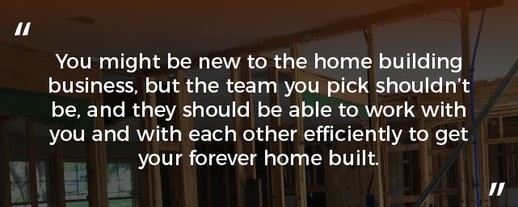
The real estate profession is just like any other: there are good realtors and not-so-good ones. There are also realtors who are great at what they do, but might not be a good fit for you for several reasons. Here are a few insider tips on how to find the right realtor for you.
1. Don't hire your relative or friend from church just because he or she is a realtor. You deserve the best, and that means the right fit. Plus, you want to maintain that friendly relationship that will go south if you hire her and she does a crappy job.
2. Find an agent that specializes in your neighborhood or general area. The good real estate agents have an area they know best: they know the neighborhoods, what's hot and what's not, and where to find the buyers that want your area. Drive around and write down the agent's name on every real estate sign you see. Make a tick mark next to the name every time you see another sign belonging to that realtor. When you're ready, call the top 2 or 3.
3. Find houses with "sold" signs on top of the real estate agent's sign. Knock on the door and ask the owner about his or her experience with that realtor. Here are some questions:
-How close to your asking price did you get?
-Did you price the house according to your realtor's advice? Did the advice turn out to be right?
-Did the realtor help you "stage" your house? (Staging is the process of arranging furniture and decor to make the house appealing to potential buyers.)
-How helpful was the realtor when negotiating the price and terms of the contract? Did you feel like you were on your own?
4. Ask your neighbors and friends for a connection to a good real estate agent, and for any names you get, ask why the person referring recommends the agent. Make sure they have good, compelling reasons (not "because she's my mom").
5. This is kind of weird and obscure, but find a local title company and ask to talk to the busiest closer in the office. Ask her which realtors have the smoothest transactions. The closer at a title company is the person who manages the closing of the transaction, and she'll have a really good feel for which Realtors are on top of their games and which are not.
 Once you have a list of realtors to interview, invite them over one at a time to give your their listing pitch. Listen for them to tell you what they think your house is worth, then tell each one you want to list it for five or ten thousand dollars more just to "see what happens". If one or more agrees to that without an argument, cross them off the list. The experts won't want to take on your listing if they can't sell it in a reasonable amount of time, and any realtor worth his or her salt knows that pricing the house too high won't get it sold.
Once you have a list of realtors to interview, invite them over one at a time to give your their listing pitch. Listen for them to tell you what they think your house is worth, then tell each one you want to list it for five or ten thousand dollars more just to "see what happens". If one or more agrees to that without an argument, cross them off the list. The experts won't want to take on your listing if they can't sell it in a reasonable amount of time, and any realtor worth his or her salt knows that pricing the house too high won't get it sold.
Ask about how they manage the listing in the MLS (Multiple Listing Service). The good ones know how to make your listing "pop": you want to show up high in other agents' searches, and you want yours to stand out. Buyers' agents don't want to show buyers too many houses for sale, so they're looking for the best ones to show. You want an agent who can get yours on the short list.
Ask about staging - how the realtor does it, what their techniques are, and why. The good ones will know what makes a house show well, and can back up their opinions with results.
Ask each one about their average listing days on market. That will give you an idea of how quickly the agent's typical listing gets sold. The time between putting a house on the market and getting it sold is a function of price and presentation: your house must be priced correctly, and it must appeal to the eye.
These are a few tips to help you find and hire the right realtor to sell you house, so you can focus on what's important: building your dream home for your family.
To finance a custom home, you start with a construction loan. First you need to pick a bank that has experience in construction loans. Like any other organization in a broader industry, banks have niches. You may have a favorite bank, but if they don't have a lot of experience with construction loans, we highly recommend finding one that does. It's not as straightforward as a conventional mortgage loan, and you want someone who knows the ins and outs.
The person you'll talk to at the bank for a construction loan is called a loan officer. That's banker speak for loan salesperson. It's their job is to drum up business for the bank.
The loan officer sits down to meet with you and tells you about all the great options they have for loans. They give you an application, ask you to bring in all your supporting documents, and make it sound pretty positive at that first meeting.
Yep, on the surface it's all unicorns and rainbows. The salesperson is probably going to tell you "everything looks good" before the bank has had time to really look into your situation. But the loan officer doesn't really get to decide—that's up to the underwriter. They're the ones who will look at your file and decide whether or not to make a loan, so be aware of that up front.
Many people are surprised at the long process of securing a construction loan, but remember, a bank is a business. When they lend you money, they are making an investment, so they have to protect themselves and do their due diligence. They know what they’re looking for so you need to meet them halfway and know what you’re looking for too. You want a bank that has experience with construction loans but won’t make false promises about what they can lend you.
As a home builder, we have relationships with several banks whose niche is doing construction loans for builders and for individuals. Having dealt with many banks over the years, we want to pass along some wisdom about finding the right bank for your construction loan. This wisdom actually comes to me from a banker I've worked with for years, whose judgement and industry knowledge we trust.
You probably have your own questions to ask about getting a construction loan, but here are two you probably didn’t think of and why you should ask them of any banker.
1. Does the bank have to follow the Fannie Mae and Freddie Mac guidelines?
If the answer is yes, the bank may be limited in the total dollar amount of loans they can make for homes built on rural land. It's an overall limit for the bank, not necessarily a limit on the amount of an individual house.
That means the loan officer who is offering that great deal (low rate, low closing costs, whatever) might not be able to actually make you that loan.
By asking this question and telling the banker why you're asking, you might save yourself a couple of weeks. You can find out if you're going to get a "no" right away rather than having to wait two weeks and hassle with all the paperwork.
2. What conditions apply to that high loan-to-value offer?
 Often times, a banker might suggest he or she can lend you 95% or even 100% of the appraised value of the home on a construction loan. Sounds like a great deal, right? That means you might not have to be out any cash at all (or very little).
Often times, a banker might suggest he or she can lend you 95% or even 100% of the appraised value of the home on a construction loan. Sounds like a great deal, right? That means you might not have to be out any cash at all (or very little).
The deal is valid, but it might have several contingencies attached. For example, it might require that you own your land or have owned it for some time. That means if you intend to buy the land with proceeds from your loan, you won't get the high loan-to-value (LTV) that brought you into the bank in the first place.
If the high LTV is what attracted you and you aren't a good fit for that particular loan program, another bank might be a better fit for your situation. You don't have to stay with the first bank you talk to! Explore your options and find one that's a good fit.
When meeting with different banks, be sure you ask detailed probing questions. Don't be intimidated by the fact that you aren't well-versed in construction loans—nobody but the banker is. Keep in mind that the banker isn't well-versed in whatever you do for a living either.
Make sure you find a bank that's the right fit for your particular situation. Your builder or realtor can help you with that, as they probably have many banking relationships and can introduce you to just the right one. It’s important to find a bank you feel comfortable working with, because you’re going to be going through a long process with them. But if the bank you choose is worth their salt, they’ll make the loan process as painless for you as possible and ultimately successful.
Your banker can tell you the specifics of their construction loan process, but here are the basics of how it works.
Paperwork
Any loan means lots of paperwork. You'll gather up your bank statements, W-2s, tax returns, and other documents and take them to the banker. He will forward them to the underwriter—that mythical creature who has the magical powers to discern whether you are a good credit risk.
More paperwork
In any construction loan process, the bank is probably going to call you back three or four times to ask for more documents or more explanation of the documents you already submitted. Why? Usually because the underwriter told him to.
Loan approval with conditions
When your loan gets approved, it'll probably be subject to some conditions. Some common conditions include requiring that the cost to build the house doesn't exceed some specified amount, that the appraised value of the house equals or exceeds some specified amount, and that your income doesn't change and you don't change jobs during the building process. There will probably be some other little details included that the bank thinks are important.
Next steps
Now you know how much you can borrow, and it's up to you to decide whether or not you can afford that amount. Just because the bank will loan you the money doesn't mean it's a good idea.
The process of getting a construction loan will test your patience. If the banker was recommended by your builder, you'll wonder if your builder intended for you to endure such treatment. It really isn't the banker trying to be difficult, it's just a difficult process.
Banking is heavily, heavily regulated. There are more rules to follow than any one person can keep track of, and the penalties for violating those rules can be steep. So, the bank will do everything they can to ensure they meet all of the requirements while making the process as smooth as possible for you.
Over the last 53 years building homes in central Oklahoma, we've done business with dozens of banks. Some have been excellent to deal with, from both the builder and customer perspectives. Some have been okay, and some have been downright difficult, if not incompetent. Since getting a construction loan to build a new house is a key element of building a home on your land, whether it's in Oklahoma or somewhere else, we want to share what we've learned.
 Construction loans for building a home are different from other types of loans. Many bankers will tell you they'll do a loan to build a new home, but not that many are actually good at it. You can ask the banker what title company they use, if they have a list of preferred appraisers, and who does the progress inspections... If they can't give you a ready answer, they might not really be that good at construction lending, and using a bank like that will lead to delays and frustration.
Construction loans for building a home are different from other types of loans. Many bankers will tell you they'll do a loan to build a new home, but not that many are actually good at it. You can ask the banker what title company they use, if they have a list of preferred appraisers, and who does the progress inspections... If they can't give you a ready answer, they might not really be that good at construction lending, and using a bank like that will lead to delays and frustration.
The best banks in Oklahoma City for construction loans will be the ones that have a dedicated team for just that purpose.
Oh, and please don't use interest rate as your guiding principle. There are so many other factors, and there won't be much difference in rates anyway. When you calculate the actual dollar difference, you might find you're stepping over dollars to get to pennies.
In Oklahoma City and surrounding areas, here are the top 5 construction lending banks (in our humble opinion):
Valor Bank. This is an old, established rural Oklahoma bank under new ownership. The new ownership consists of talented and experienced bankers looking for new opportunities, and their construction lending department is top-notch in customer service, honesty, and follow-through.
F&M Bank (and FMB Mortgage). This is a family-owned bank with years of experience in construction lending. For years, we’ve dealt with Chad Johnson in the Crescent branch, but they've recently re-worked their internal systems to make their customer experience even better.
Advantage Bank. While not a large bank, Advantage "gets it" when it comes to lending money to build. One unique element is Advantage doesn't have its own mortgage department (as of this writing), so they do business with many mortgage companies around town. This network of connections can help you if for some reason you want to separate your construction business from your mortgage business.
Tinker Federal Credit Union. TFCU, like others on this list, has been doing loans for customers to build new homes for years, and is very familiar with the more rural projects.
NBC Bank. We haven't done a great deal of business with NBC, but what we have done has been very smooth for our clients and for us. The loan officer we do business with at NBC has a deep background in construction lending from another large Oklahoma bank, so she knows what she's doing.
For more information about construction loans, please check out these articles:
Are you getting the right construction loan?
Financing your custom home doesn't have to be scary
Home construction loans: choosing the right bank
There’s a lot more steps and details we could tell you about the custom home building process, but unless you decide that’s the best option for your family we’ll save our breath.
Every family is different and wants and needs different things from a home. And just as there are many different kinds of families, there are many different kinds of homes and ways to get the right home for you. What we want most is for you to take the tips shared here and use them to find the people, whether that’s a builder, realtor, or banker, who can help you get your forever home. And if you think a builder like Turner & Son might be an asset in your search, get in touch and we’ll talk about what it will take to get exactly what you want in your Oklahoma home.
![]()
6420 W. Memorial Rd.
Oklahoma City, OK 73142
405.285.2856
info@turnerandsonhomes.com
"I can't express enough how thrilled I am with the exceptional service provided by Turner & Son Homes! As a real estate agent, it's imperative to have a reliable and skilled builder to turn to, and Turner & Son Homes exceeded all expectations."
Bryce Wheeler, Real Estate Agent
October 2023
Turner & Son Homes | Copyright © 2018 All Rights Reserved